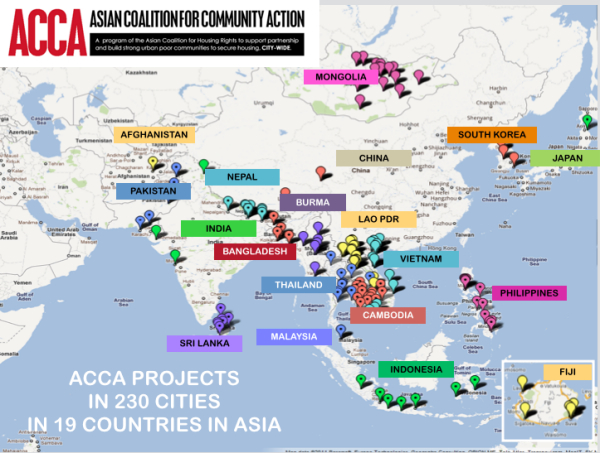- Home
- About us
- Activities
-
About us
- News & Update
- Library
- Countries
- extra
- contact
about us
What We Do
| Solving Asia’s urban poor housing problems using Asia’s greatest resource : PEOPLE |
ACHR, now 24 years old, is a coalition of Asian professionals, NGOs and community organizations committed to finding ways to make change in the countries where their work is rooted - change that goes along with the particular realities of their own cultures, politics and ways of doing things. The collective experience of all these groups represents a huge quantum of understanding and possibilities - Asia’s own home-grown development wisdom. After linking together as a coalition first in 1989, we began exploring ways of joining forces and supporting each other through a growing number of joint initiatives: housing rights campaigns, fact-finding missions, training and advisory programs, exchange visits, workshops and study tours, projects to promote community savings and community funds and citywide slum upgrading.
This mutual support and cross-pollination of ideas between Asian groups is important, because so many of the development theories, planning paradigms and urban development models which set the course in Asia - and which we are often obliged to follow - are transplants from somewhere else. And sometimes in our rush to grow and to develop, the wisdom and practices that have sustained Asian societies for centuries get lost, and we forget our own considerable human wealth. The skyscrapers and the shopping malls may be going up fast and furiously, and our “tiger” economies may be booming, but the gap between rich and poor is getting wider, and slums and squatter settlements are still spreading faster than solutions from the government or the market sector can keep up with.
Through this collaborative work over many years, all these people and organizations in the coalition have found that they had one crucial thing in common: a belief that the key resource to solve our enormous problems of poverty and housing is the people who experience those problems directly, who are most urgently wanting change and most vitally motivated to resolve those problems. The poor themselves represent Asia’s greatest and least-tapped development force.
Unlocking that huge problem-solving force . . .
Now the ACHR coalition’s work has come to a new stage of scale and action, with the ACCA Program, which brings together many of the elements these groups have developed over the years and taps this huge people’s problem-solving force. The program allows people in a city to come together, think together, look at their problems together and take action right away to start fixing them, using the simple tools the program offers. And as this action by people grows in scale and strength around the Asia region, it becomes a new, proactive political process also, in which the poor are winning support for their initiatives from their local governments and other local stakeholders and becoming vital and accepted development actors in their cities. The ACCA Program is now supporting groups in 165 cities, in 19 Asian countries to take action in different ways to show visible change by people, to show that poor people themselves can make this change, and to show this change happening at scale.
The program allows the implementing groups in different cities to meet often, to compare notes, and to work together in new ways and with a new intensity, to bring the region’s community-driven and citywide development processes up to a new level, through ACCA-supported projects they use to strengthen their initiatives. In this way, the ACCA Program is becoming a new learning platform in the region - a platform which allows community groups, professionals and local officials to see, to learn, to share, to grow and to develop a common direction - a common direction that is community-driven and citywide and rooted in Asia’s own politics, its own cultures and its own social realities.



Arif Hasan (OPP, URC)
Salim Alim Uddin (OPP)
Anwar Rashid (OPP)
Muhammad Younus (URC)

Lajana Manandhar
(Lumanti Support Group for Shelter)
Prafulla Pradhan (UNESCAP)
(Lumanti Support Group for Shelter)
Prafulla Pradhan (UNESCAP)

Somsak Phonpakdee & Sok Visal (CDF Cambodia)

The Lao Women’s Savings
Network and the National
Women's Union.
Network and the National
Women's Union.

ACHR Sec and UPCA members
Community Organisation
Development Institute - CODI.
Community Organisation
Development Institute - CODI.

Think City
Penang (Veronica Liew Wir Ling)
Third World Network
Penang (Veronica Liew Wir Ling)
Third World Network

Tibet Heritage Fund

Sheela Patel (SPARC)
Jockin Arputham (NSDF)
Kirtee Shah (ASAG)
Sandeep Virmani (Abhiyan)
Tibet Heritage Fund
Jockin Arputham (NSDF)
Kirtee Shah (ASAG)
Sandeep Virmani (Abhiyan)
Tibet Heritage Fund

Johan Silas (KIP)
Wardah Hafidz
(UPC and UPLINK in Jakarta)
Wardah Hafidz
(UPC and UPLINK in Jakarta)

Tran Minh Chau and ACVN and
LeDieu Anh (ACCA Vietnam)
LeDieu Anh (ACCA Vietnam)

Manjusha Rai (Thimpu) tempoarily halted

Enhe Tsedendorg
(Urban Development Resource
Center, Ulaanbatar)
CHRD
(Urban Development Resource
Center, Ulaanbatar)
CHRD

DSK Dibalock Singha; plus new ACCA partners

K.A. Jayaratne (Sevanatha)
Nandasiri Gamage (Women's Coop)
Nandasiri Gamage (Women's Coop)

Ruby Haddad UPCA
Fr. Norberto Carcellar
(PACSI and Homeless People's Federation)
May Domingo (PACSI / ACHR)
Denis Murphy (Urban Poor Associates)
Bimbo Fernandez
(Pagtambayayong Foundation)
Jing Karaos (ICSI and Ateneo, Manila)
Ana Oliveros (FDUP)
Fr. Norberto Carcellar
(PACSI and Homeless People's Federation)
May Domingo (PACSI / ACHR)
Denis Murphy (Urban Poor Associates)
Bimbo Fernandez
(Pagtambayayong Foundation)
Jing Karaos (ICSI and Ateneo, Manila)
Ana Oliveros (FDUP)

Prof. Mitsuhiko Hosaka
(Nihon Fukushi University)
Prof. Uchida Yozo (Tokyo University)
Fr. Peter Shimokawa (Sophia University, Nojiren)
Fr. Jorge Anzorena
(Selavip, Sophia University)
Mr. Etsuzo Inamoto (SHARE)
(Nihon Fukushi University)
Prof. Uchida Yozo (Tokyo University)
Fr. Peter Shimokawa (Sophia University, Nojiren)
Fr. Jorge Anzorena
(Selavip, Sophia University)
Mr. Etsuzo Inamoto (SHARE)

Local CBO not named ....
implementing ACCA projects
implementing ACCA projects

KOCER
KCHR Korea
Asian Bridge
KCHR Korea
Asian Bridge
Current Activities ___________________
There is a long HISTORY leading up to the activities above ... enabling ACHR to expand ON-SCALE throughout 19 countries and 165 cities and towns. The next section of ABOUT US gives a summary of ACHR's develpoment history.












